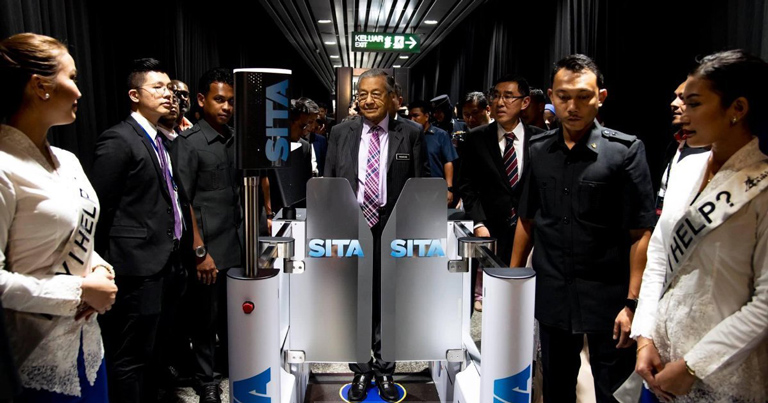
Kuala Lumpur International Airport (KLIA) has launched a single token passenger journey initiative, as part of the Malaysian gateway’s 21-year anniversary. During the celebration, Malaysian Prime Minister, Tun Dr Mahathir Mohamad, tested the new biometric passenger processing, supplied by SITA, at KLIA Main Terminal.
According to Tan Sri Datuk Zainun Ali, Chairman of Malaysia Airports, Malaysia Airports plays a crucial role in leading the aviation industry and facilitating the economic aspirations of the country. She added that the implementation of the latest technology will give Malaysia a competitive edge in attracting more airlines to operate from KLIA, while continuous enhancement of facilities and service quality will ensure a seamless journey for passengers.
She also highlighted the importance of inter-terminal connectivity in positioning the airport as a strong aviation hub and said: “KUL already has many inherent advantages such as its geographic location within a strong area of growth, its combined terminal capacity of 75 million passengers per year and three independent runways. Moving forward, we hope to be able to improve the connectivity at KUL by implementing the airside transfer between the two terminals. We recently signed a memorandum of business collaboration with POS Aviation, one of the ground handlers at the airport, to design and develop a virtual platform that will serve to facilitate airside transfers for self-connect passengers who travel through KUL.”
Malaysia Airports demonstrated SITA Smart Path biometric processing, which uses facial biometric ID management technology to automate the travel journey from check-in to boarding. Once registered, travellers need to only have their faces scanned without having to produce documents at every stage of their journey. The technology is designed to easily integrate into existing airport and airline infrastructure, including standard common-use systems, check-in kiosks, self-service gates for secure access, and boarding.
Meanwhile, Malaysia Airports also indicated its intention to collaborate with Huawei to implement 5G network coverage at the airport.
The official ceremony was attended by YAB Tun Dr Mahathir Mohamad, Prime Minister of Malaysia; YB Tuan Loke Siew Fook, Minister of Transport; Tan Sri Datuk Zainun Ali, Chairman of Malaysia Airports; and Raja Azmi Raja Nazuddin, Group Chief Executive Officer of Malaysia Airports.
During the walkabout at the terminal, Tun Dr Mahathir also tested the efficiency and accuracy of the new security body scanners that have been installed at KUL. The new scanners are able to detect both non-organic and organic foreign objects on the body. This means that passengers who have no such items on their body will no longer require manual security pat-downs. Currently ten units have been installed at both terminals in KUL and there will be 100 more installed in the airport by year 2022.






